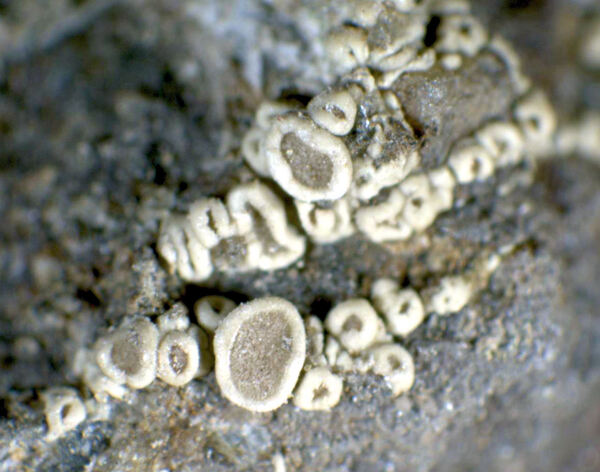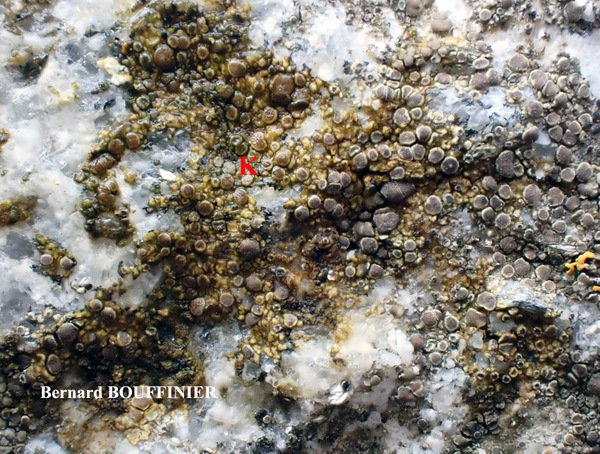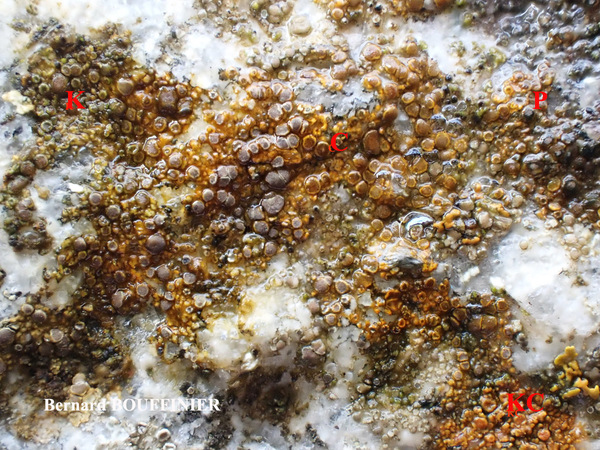Polyozosia fugiens (Nyl.) S.Y. Kondr., Lőkös & Farkas
in Kondratyuk & al., Acta Bot. Hung., 62, 1-2: 102, 2020. Basionym: Lecanora fugiens Nyl. - Flora, 56: 289, 1873.
Synonyms:
Distribution: C - Tosc, Sar. S - Cal.
Description: Thallus crustose, endosubstratic or thinly episubstratic but poorly evident and reduced to small granules around the apothecia, pale yellow to yellowish brown, sometimes with a distinct prothallus of whitish dendroid hyphae. Apothecia lecanorine, sessile, 0.3-0.8(-1) mm across, with a flat to slightly convex, pale brown to reddish brown, epruinose or slightly pruinose disc and a usually paler, thin, smooth, entire thalline margin. Thalline exciple c. 60 μm wide, more or less distinctly corticate, the cortex 25-30 μm thick laterally, 30-45 μm thick at base, inspersed with sparse granules visible under polarized light, which are insoluble in K and soluble in N; proper exciple indistinct to well-delimited and 10-30 μm wide; epithecium yellow-brown to reddish brown, K- and N-, inspersed with coarse crystals visible under polarized light, which are soluble in K and insoluble in N, overlain by a thin epipsamma of crystals located above the paraphyses tips, which are insoluble in K and soluble in N; hymenium colourless, 50-70 μm high; paraphyses simple or sparingly branched in upper part, 1.5-2 μm thick at base, the apical cells slightly swollen; hypothecium colourless to yellowish 100-120 μm high, of adglutinated hyphae, without crystals. Asci 8-spored, elongate-clavate, very thin-walled, with a K/I+ blue, tall tholus penetrated by a faintly amyloid apical cushion, the wall K/I-, surrounded by a K/I+ blue outer layer, Lecanora-type. Ascospores 1-celled, hyaline, ellipsoid, 9-15 x 4.5-6 μm. Photobiont chlorococcoid. Spot tests: thallus and apothecial margin K+ pale yellow, C+ orange, KC+ orange, P- or P+ orange; apothecial disc K+ yellow, C+ orange, KC+ orange, P+ orange; apothecia UV+ yellowish to yellow-orange. Chemistry: an unknown xanthone, plus variable quantities of pannarin. Note: a maritime silicicolous lichen, probably restricted to Tyrrhenian Italy. For further details see Bertrand & Roux (2011).
Growth form: Crustose
Substrata: rocks
Photobiont: green algae other than Trentepohlia
Reproductive strategy: mainly sexual
Most common in areas with a humid-warm climate (e.g. most of Tyrrenian Italy)
Taxon bound to maritime-coastal situations
Commonnes-rarity: (info)
Alpine belt: absent
Subalpine belt: absent
Oromediterranean belt: absent
Montane belt: absent
Submediterranean belt: absent
Padanian area: absent
Humid submediterranean belt: absent
Humid mediterranean belt: rare
Dry mediterranean belt: absent
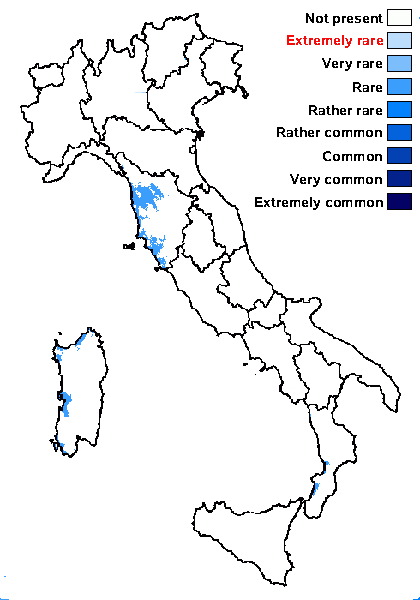
Predictive model
Herbarium samples
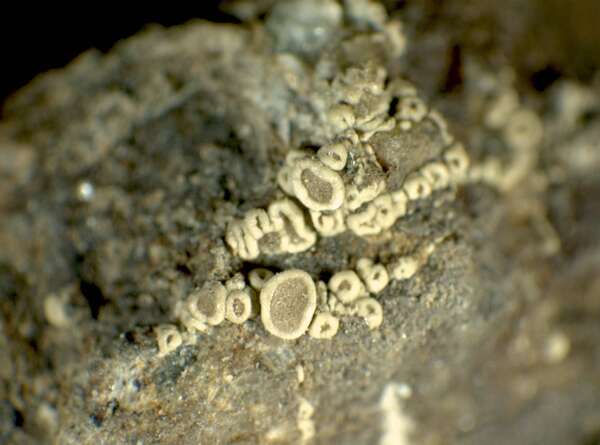

P.L. Nimis; Owner: Department of Life Sciences, University of Trieste
Herbarium: TSB (13204)
2001/11/25
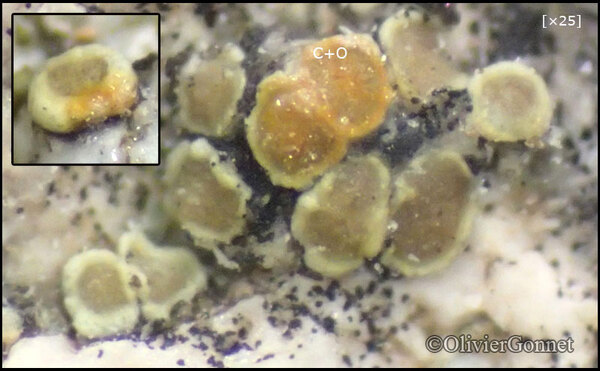
Courtesy Danièle et Olivier Gonnet - Source: https://www.afl-lichenologie.fr/Photos_AFL/Photos_AFL_M/Texte_M/Myriolecis_fugiens.htm
France, Figari - Corse - (20) - Pointe de Ventilègne, rochers littoral, alt. 3 m
21/10/2014
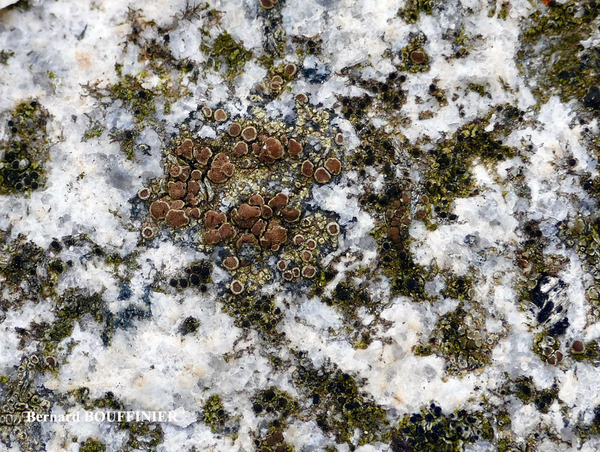
Bernard Bouffinier - Source: http://www.lichensmaritimes.org/index.php?task=fiche&lichen=77&lang=en
France, Plogoff
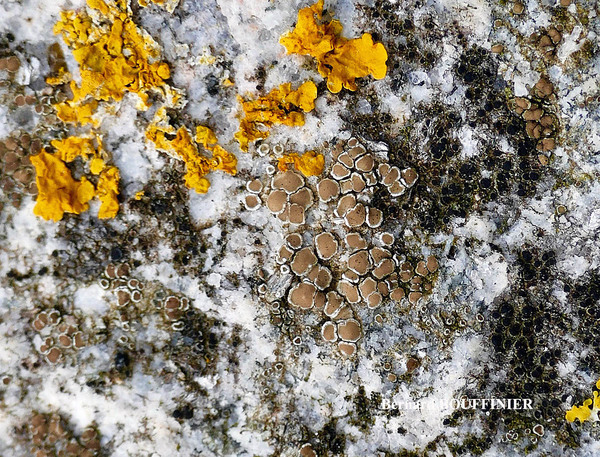
Bernard Bouffinier - Source: http://www.lichensmaritimes.org/index.php?task=fiche&lichen=77&lang=en
France, Plogoff
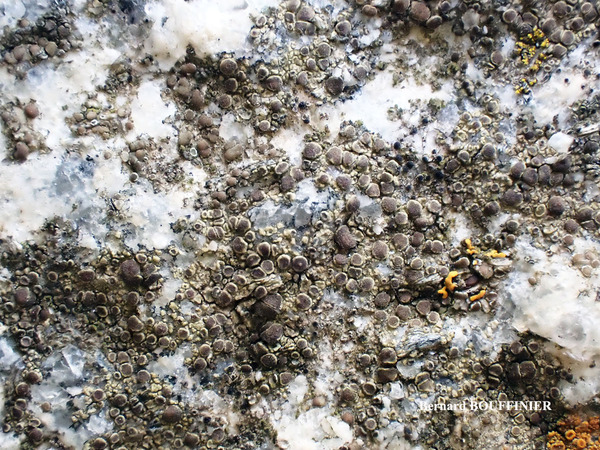
Bernard Bouffinier - Source: http://www.lichensmaritimes.org/index.php?task=fiche&lichen=77&lang=en
France, Baie des Trespasses
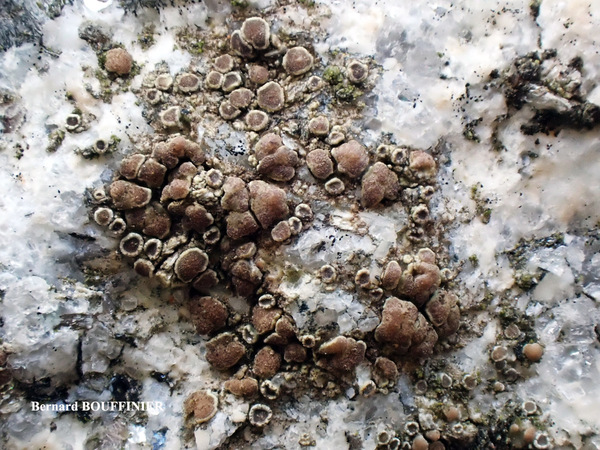
Bernard Bouffinier - Source: http://www.lichensmaritimes.org/index.php?task=fiche&lichen=77&lang=en
France, Baie des Trespasses
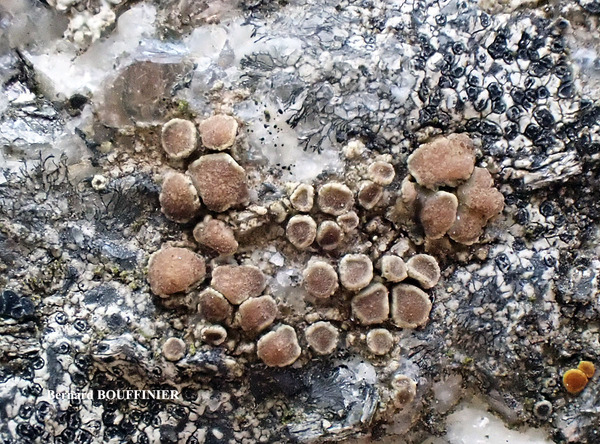
Bernard Bouffinier - Source: http://www.lichensmaritimes.org/index.php?task=fiche&lichen=77&lang=en
France, Baie des Trespasses
Growth form: Crustose
Substrata: rocks
Photobiont: green algae other than Trentepohlia
Reproductive strategy: mainly sexual
Most common in areas with a humid-warm climate (e.g. most of Tyrrenian Italy)
Taxon bound to maritime-coastal situations
Commonnes-rarity: (info)
Alpine belt: absent
Subalpine belt: absent
Oromediterranean belt: absent
Montane belt: absent
Submediterranean belt: absent
Padanian area: absent
Humid submediterranean belt: absent
Humid mediterranean belt: rare
Dry mediterranean belt: absent

Predictive model
| Herbarium samples |


P.L. Nimis; Owner: Department of Life Sciences, University of Trieste
Herbarium: TSB (13204)
2001/11/25

Courtesy Danièle et Olivier Gonnet - Source: https://www.afl-lichenologie.fr/Photos_AFL/Photos_AFL_M/Texte_M/Myriolecis_fugiens.htm
France, Figari - Corse - (20) - Pointe de Ventilègne, rochers littoral, alt. 3 m
21/10/2014

Bernard Bouffinier - Source: http://www.lichensmaritimes.org/index.php?task=fiche&lichen=77&lang=en
France, Plogoff

Bernard Bouffinier - Source: http://www.lichensmaritimes.org/index.php?task=fiche&lichen=77&lang=en
France, Plogoff

Bernard Bouffinier - Source: http://www.lichensmaritimes.org/index.php?task=fiche&lichen=77&lang=en
France, Baie des Trespasses

Bernard Bouffinier - Source: http://www.lichensmaritimes.org/index.php?task=fiche&lichen=77&lang=en
France, Baie des Trespasses

